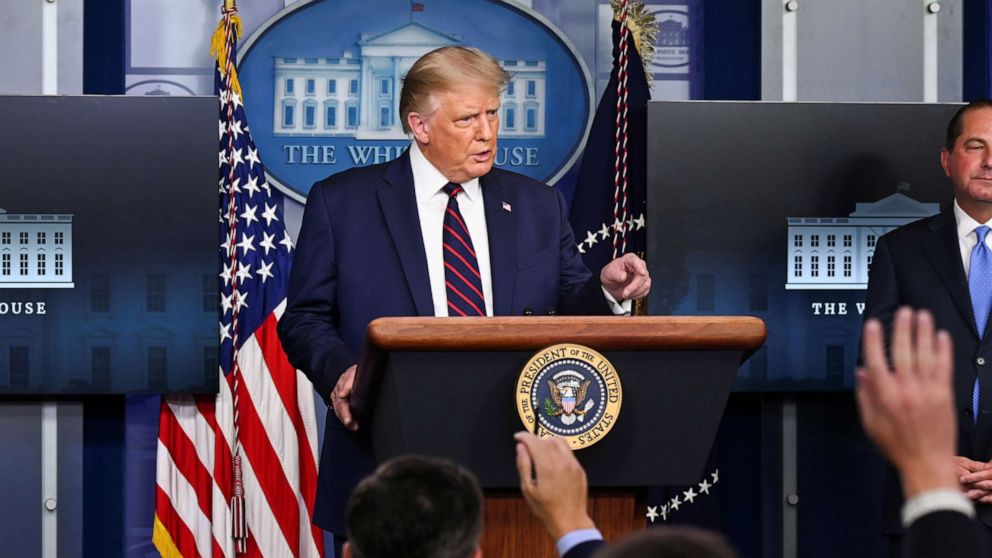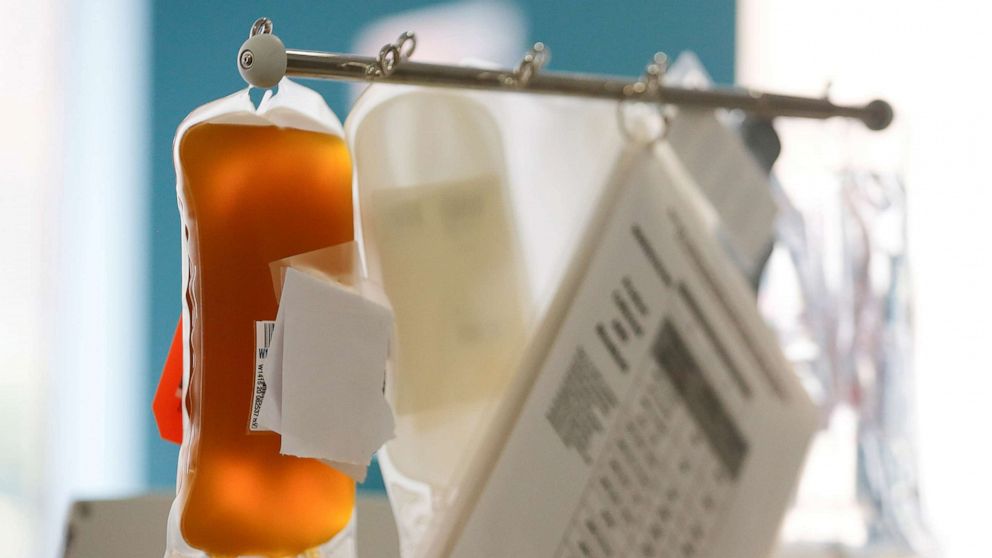美国食品和药物管理局周日宣布,将对住院病人的恢复期血浆治疗发放紧急授权新冠肺炎病人——但是一些在大流行前线的研究人员说,这一举动将使他们的工作更加困难。
总统唐纳德·特朗普在周日晚上的白宫简报会上宣扬等离子体的承诺。
特朗普说:“这是一种强有力的疗法,它从康复病人的血液中输入非常非常强的抗体,帮助治疗正在与当前感染作斗争的病人。”“它的成功率令人难以置信。”
美国食品和药物管理局局长斯蒂芬·哈恩博士说,加快审批是政府“减少繁文缛节”工作的结果
该声明是在高压推动下做出的,旨在为COVID-19找到有效的治疗方法。有一些数据支持的血浆疗法一直被寄予厚望,尽管官员们表示,来自随机对照试验的临床数据仍在收集之中。
美国食品和药物管理局有权在紧急情况下许可有希望的疗法,如果它们被证明是安全的并且看起来有希望的话——血浆就是这样。
但是一些在大流行前线的医学专家反对周日的声明,他们说紧急授权可能会使研究治疗所需的试验更加困难。
在路易斯安那州巴吞鲁日的LSU健康科学中心,霍利斯·奥尼尔博士的团队通过范德比尔特大学加入了一个新宣布的临床试验,他告诉ABC新闻:“如果患者在登记之前已经接受了这种治疗,那么我们就不能登记那个患者。”
“如果我们真的让他们参与进来,临床医生可能会在之后给他们用药,这将造成巨大的混乱,破坏试验的完整性。”奥尼尔说。“我们仍然可以做这项研究,但它会产生选择偏差——或者我们需要另一种机制来控制血浆作为标准护理的潜在用途。”
研究人员称,随机临床试验——其中一部分患者只接受安慰剂——已经在努力招募志愿者。

2020年8月23日,美国华盛顿白宫布雷迪新闻发布室,美国总统唐纳德·特朗普(Donald Trump)在关于冠状病毒(COVID-19)最新发展的新闻发布会上向举手提问的媒体成员做手势。
NYU朗格尼健康中心的传染病专家塞琳·高德博士在推特上回应周日的声明时表示:“美国食品和药物管理局的紧急使用授权使得进行安慰剂对照、随机临床试验以确定其是否有效变得更加困难。”
当被问及紧急授权是否会抑制研究人员进行清晰、干净的临床试验的能力时,哈恩在周日的新闻发布会上告诉美国广播公司新闻,他们认为这一新的绿灯是一个机会,他表示希望这实际上会鼓励更多的人参与试验。
哈恩说:“我们都可以利用这个机会,鼓励人们在这一危机时刻参与所有治疗剂和疫苗的临床试验,因为它是如此重要,它为每个人提供了服务。”
美国食品和药物管理局说,周日的授权“不是为了取代随机临床试验”,它称之为“至关重要。”
在一份声明中,美国生物化学和分子生物学协会(ASBMB)也抨击总统推行他们所描述的未经证实的治疗方法,这种方法有生命危险。
ASBMB说:“特朗普总统再次将他的政治目标置于美国公众的健康和福祉之上,他敦促美国食品和药物管理局为COVID-19患者的恢复期血浆治疗签发紧急使用授权。”
恢复期血浆是从已康复的COVID-19患者血液中分离出来的黄色液体,可能有助于一些冠状病毒患者对抗或从疾病中恢复。血浆中发现的抗体被收集并用于治疗新病人。
除了总统对血浆的赞扬之外,美国食品和药物管理局在他们的语言中更有分寸,称他们已经“确定有理由相信”血浆治疗“可能有效地”减轻了COVID-19的严重性和对患者系统的控制力,以及“已知的和潜在的益处”...超过已知和潜在的风险。”
本周早些时候,美国国家卫生研究院的一些科学家似乎要求美国食品和药物管理局停止对血浆治疗的紧急授权,尽管人们普遍认为这已经迫在眉睫。周四,国家卫生研究院的主任说有“有希望的结果”...现在正在进一步评估。”
美国国家过敏和传染病研究所的H. Clifford Lane博士在接受《纽约时报》采访时表示,“通过随机对照试验获得可靠的数据是极其重要的。”
他说:“大流行不会改变这一点。”

2020年4月17日,西雅图暴发期间,在西北血液厂西雅图中心献血中心,可以看到一名冠状病毒病(COVID-19)患者的恢复期血浆。
在周日对美国广播公司新闻的一份声明中,美国食品和药物管理局确认他们将继续与国家卫生研究院合作,并明确指出美国食品和药物管理局的决策过程是独立的,国家卫生研究院“不参与”这一过程
哈恩周日告诉美国广播公司,美国食品和药物管理局正准备宣布这一授权:“总会有对话,其中一部分是在机构之间进行的——这是非常好的事情。”
哈恩说:“作为科学家,我们受到挑战是非常好的,那些挑战我们的人仔细地看着数据,这可能是一些噪音,可能是你在媒体上听到的。”“但归根结底,我们对FDA的这一行动符合监管标准非常有信心。”
美国食品和药物管理局生物制品评估和研究中心主任彼得·马克斯(Peter Marks)在特朗普周日的简报会前接受记者电话采访时说,“这是在现实世界中做到的一个优势。”“这是一个弱点,我们没有一种没有血浆的普通安慰剂。”
Trump, FDA tout COVID-19 convalescent plasma treatment, but some express concerns
The Food and Drug Administration announced Sunday it was issuing an emergency authorization for convalescent plasma treatment in hospitalizedCOVID-19patients -- but some researchers on the front lines of the pandemic say the move will make their work more difficult.
PresidentDonald Trumptouted the promise of plasma at Sunday evening's White House briefing.
"This is a powerful therapy that transfuses very, very strong antibodies from the blood of recovered patients to help treat patients battling a current infection," Trump said. "It's had an incredible rate of success."
FDA Commissioner Dr. Stephen Hahn said that the expedited approval was the result of the administration's work to "cut back red tape."
The announcement comes amid the high-pressure push to pinpoint an effective treatment for COVID-19. Blood plasma treatment, which has some data to support it, has been eyed with high hopes, although officials say that clinical data from randomized controlled trials is still being collected.
The FDA has the authorization to license promising therapies under emergency situations if they are proven safe and seem promising -- which plasma has.
But some medical experts on the front lines of the pandemic pushed back against Sunday's announcement, saying that the emergency authorization could make it more difficult to perform the very trials necessary to study the treatment.
"If patients have already gotten this treatment before they enroll, then we can't enroll that patient," Dr. Hollis O'Neal, whose team at LSU Health Sciences Center in Baton Rouge, Louisiana, has joined a newly announced clinical trial through Vanderbilt University, told ABC News.
"If we do enroll them, the clinician could potentially give it afterward, creating a huge confounder, violating the integrity of the trial." O'Neal said. "We could still do the study, but it would create selection bias -- or we would need another mechanism to control for potential use of plasma as standard care."
Randomized clinical trials -- in which a percentage of patients only receive a placebo -- are already struggling to recruit volunteers, researchers say.

U.S. President Donald Trump gestures towards media members, who raise their hands to ask questions, during a news conference about the latest coronavirus disease (COVID-19) developments, in the Brady Press Briefing Room of the White House in Washington, U.S. August 23, 2020.
"The @US_FDA's emergency use authorization just makes it harder to conduct placebo-controlled, randomized clinical trials to figure out if it works," Dr. Céline Gounder, infectious diseases specialist at NYU Langone Health, tweeted in response to Sunday's announcement.
Asked whether the emergency authorization might inhibit researchers' ability to conduct clear, clean, clinical trials, Hahn told ABC News on a press call Sunday that they view this new green light as an opportunity, and he expressed hope that it would in fact encourage more people to participate in trials.
"We all can use this as an opportunity to encourage people to participate in clinical trials for all therapeutic and vaccine agents in this time of crisis because it's so important and it does a service to everyone," Hahn said.
The FDA said that Sunday's authorization "is not intended to replace randomized clinical trials," which it called "critically important."
In a statement, the American Society for Biochemistry and Molecular Biology (ASBMB) also blasted the president for pushing what they characterize as an unproven treatment that dangerously risks lives.
"President Trump is once again putting his political goals ahead of the health and well-being of the American public with his push for the Food and Drug Administration to issue an emergency use authorization for convalescent blood plasma treatment for COVID-19 patients," the ASBMB said.
Convalescent plasma, the yellow liquid separated from the blood of recovered COVID-19 patients, may help some coronavirus patients fight off or recover from the disease. Antibodies found in that plasma are harvested and deployed to treat the newly sick.
Alongside the president's praise of plasma, the FDA was far more measured in their language, saying they had "determined it is reasonable to believe" that plasma treatment "may be effective" in mitigating COVID-19's severity and grip strength on patients' systems, and that the "known and potential benefits ... outweigh the known and potential risks."
Earlier this week, some scientists at the National Institutes of Health appeared to ask the FDA to pump the brakes on emergency authorization for plasma treatment, though it was widely thought imminent. On Thursday the director of the NIH said there were "promising results ... now being further assessed."
Dr. H. Clifford Lane of the National Institute of Allergy and Infectious Diseases told the New York Times that it's extremely important to have "robust data through randomized control trials."
"A pandemic does not change that," he said.

Convalescent plasma from a recovered coronavirus disease (COVID-19) patient is seen at the Central Seattle Donor Center of Bloodworks Northwest during the outbreak in Seattle, April 17, 2020.
In a statement Sunday to ABC News, the FDA affirmed their continued collaboration with the NIH, and explicitly noted that the FDA's decision-making process is separate, and a process in which the NIH is "not involved."
"There's always dialogue, and part of that dialogue that goes on between agencies -- it's something that's very good," Hahn told ABC Sunday as the FDA prepared to announce the authorization.
"It's very good for us to be challenged as scientists, to look at the data carefully by those who challenge it, and that may have been some of that noise may have been what you were hearing in the press," Hahn said. "But at the end of the day we're very confident at FDA that this action meets the regulatory standard."
"It's a strength that this was done in the real world," director of the FDA Center for Biologics Evaluation and Research Dr. Peter Marks said in a call with reporters prior to the Trump's briefing Sunday. "It is a weakness that we don't have a plain placebo with no plasma there at all."






